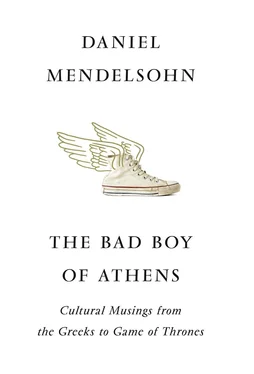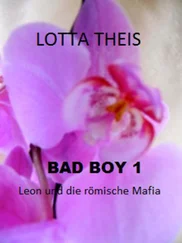It’s unlikely that Medea – Euripides’ Medea , that is, not the play that Deborah Warner staged – will have trouble surviving the grotesque, giggling, wrongheaded treatment it received on Broadway. If so, it wouldn’t be the first time that the playwright bounced back after some rough treatment. Soon after Aristophanes lampooned him (intentionally) in his Thesmophoriazousae , Euripides left town for good. His destination was about as far from Athens, culturally and ideologically, as you could get: the royal court of Pella, capital of the backwoods kingdom of Macedon, a country that would take another century to achieve world-historical status. (It’s where Alexander the Great was born.) He left, so the story goes, because he was disgusted by his city’s descent into demagoguery, intellectual dishonesty, political disorder, and defeat. But perhaps he was also smarting because of Thesmophoriazousae ; perhaps he was tired of being misunderstood.
And yet perhaps, too, there was time for one more effort; perhaps he might have the last laugh. Perhaps, from a burlesque, a deliberate misinterpretation, a pandering by a comedian to the common taste in order to achieve a glib success, something worthwhile might result. Let us imagine this aged poet as he leaves Athens and embarks on his difficult northward journey, turning an idea over in his mind – an idea that comes to him, as it happens, from Thesmophoriazousae itself. An all-female festival; a man eager to see what the women get up to, when the men aren’t watching. A grotesque foray into drag that convinces no one; a masquerade that ends in apprehension, and terrible peril. Not a bad idea for a play – not a comedy, this time around, but something terrible, something that will bring his citizen audience close to the core of what great theatre is about: plotting, disguise, recognition, revelation, violence, awful knowledge. He arrives in Macedon and gets to work. Three years later, the play is finished: Bacchae . By the time it is produced back home in Athens, winning its author one of his rare first prizes, Euripides is dead. But from the mockers, those who wilfully mistake his meanings, he has stolen a victory. This show, it is safe to say, will go on.
– The New York Review of Books , 13 February 2003
Whatever else you say about the career of Alexander the Great – and classicists, at least, say quite a lot (one website that tracks the bibliography lists 1200 items) – it was neither funny nor dull. So it was a sign that something had gone seriously wrong with Oliver Stone’s long, gaudy, and curiously empty new biopic about Alexander when audiences at both showings I attended greeted the movie with snickering and evident boredom. The first time I saw the picture was at a press screening at a commercial theatre, and even from the large central section that was (a personage with a headset informed us) reserved for ‘friends of the filmmaker’ you could hear frequent tittering throughout the film – understandable, given that the characters often have to say things like ‘from these loins of war, Alexander was born’. A week later, at a matinee, I got to witness a reaction by those unconstrained by the bonds of either duty or amity: by the end of the three-hour-long movie, four of the twelve people in the audience had left.
This was, obviously, not the reaction Stone was hoping for – nor indeed the reaction that Alexander’s life and career deserve, whether you think he was an enlightened Greek gentleman carrying the torch of Hellenism to the East or a savage, paranoid tyrant who left rivers of blood in his wake. The controversy about his personality derives from the fact that our sources are famously inadequate, all eyewitness accounts having perished: what remains is, at best, secondhand (one history, for instance, is based largely on the now-lost memoirs of Alexander’s general and alleged half-brother, Ptolemy, who went on to become the founder of the Egyptian dynasty that ended with Cleopatra), and at worst, highly unreliable. A rather florid account by the first-century-AD Roman rhetorician Quintus Curtius often reflects its author’s professional interests – his Alexander is given to extended bursts of eloquence even when gravely wounded – far more than it does the known facts. But Alexander’s story, even stripped of romanticizing or rhetorical elaboration, still has the power to amaze.
He was born in 356 BC, the product of the stormy marriage between Philip II of Macedon and his temperamental fourth wife, Olympias, a princess from Epirus (a wild western kingdom encompassing parts of present-day Albania). His childhood was appropriately dramatic. At around twelve he had already gained a foothold on legend by taming a magnificent but dangerously wild stallion called Bucephalas (‘Oxhead’) – a favourite episode in what would become, after Alexander’s death, a series of increasingly fantastical tales and legends that finally coalesced into a literary narrative known as the Alexander Romance, which as time passed was elaborated, illuminated, and translated into everything from Latin to Armenian. While still in his early teens, he was at school with no less a teacher than Aristotle, who clearly made a great impression on the youth. Years later, as he roamed restlessly through the world, Alexander took care to send interesting zoological and botanical specimens back to his old tutor.
At sixteen he’d demonstrated enough ability to get himself appointed regent when his father, a shrewd statesman and inspired general who dreamed of leading a pan-Hellenic coalition against Persia, was on campaign. He used this opportunity to make war on an unruly tribe on Macedon’s eastern border; to mark his victory he founded the first city he named after himself, Alexandropolis. At eighteen, under his father’s generalship, he led the crack Macedonian cavalry to a brilliant victory at the Battle of Chaeronea, where Macedon crushed an Athenian-Theban coalition, thereby putting an end to southern Greek opposition to Macedonian designs on hegemony. At twenty, following the assassination of Philip – in which he (or Olympias, or perhaps both) may have had a hand – he was king.
That, of course, was just the beginning. At twenty-two, Alexander led his father’s superbly trained army across the Hellespont into Asia. Next he liberated the Greek cities of Asia Minor from their Persian overlords (i.e., made them his own: the governors he appointed were not always champions of Hellenic civic freedoms), staged his most brilliant military victory by successfully besieging the Phoenician island fortress of Tyre (part of his famous strategy to ‘defeat the Persian navy on land’ by seizing its bases), and freed a grateful Egypt from harsh Persian suzerainty. While in Egypt, he indulged in one of the bizarre gestures that, wholly apart from his indisputable genius as a general, helped make him a legend: he made an arduous and dangerous detour to the oracle of Ammon in the desert oasis of Siwah, where the god revealed that Alexander was in fact his own son – a conclusion with which Alexander himself came increasingly to agree. While in Egypt he also founded the most famous of his Alexandrias, a city that eventually displaced Athens as the centre of Greek intellectual culture, and where his marvellous tomb, a tourist attraction for centuries after, would eventually rise.
Although Alexander had, apparently, set out simply to complete his father’s plan – that is, to drive the Persians away from the coastal cities of Asia Minor, which for centuries had been culturally Greek, ostensibly in retaliation for a century and a half of destructive Persian meddling in Greek affairs – it’s clear that once in Asia, he began to dream much bigger dreams. Within three years of crossing the Hellespont, he had defeated the Persian Great King, Darius III, in a series of three pitched battles – Granicus, Issus, and Gaugamela – in which he triumphed against sometimes dire odds. It was in the rout that followed Issus that Darius fled the field of battle, leaving his wife, children, and even his mother behind in the baggage train. Alexander, with characteristic largesse and fondness for the beau geste – like most extravagant personalities, he had a capacity for generosity as great as his capacity for ruthlessness – honourably maintained the captives in royal state.
Читать дальше












